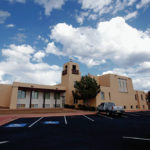Despite any formal documentary evidence, I am convinced my grandfather was Northern Indiana’s foremost connoisseur of garage sales. We thought his prized find was a thoroughly dilapidated and, frankly, somewhat deranged-looking toy organ grinder’s monkey. What’s not to love? Wind it up, and it’d clang its cymbals and stomp its feet, making plenty of racket but never going very far.
Fast-forward some years, and consider my—or your—social media feed during any recent election. I see plenty of foot-stomping and racket-making, but I’m not sure it’s going anywhere productive.
Perhaps that’s because, without love, we’re all just wound-up cymbal-clangers.
I may be biased in this view. After all, we’re all products of our own time and place, and I’m a preacher’s kid who found an intellectual—and now professional—home in Howard Payne University’s Guy D. Newman Honors Academy.
Over its more than five decades, the Honors Academy and its graduates continue “Facing the Future with Faith and Knowledge” by intentional study of those things that prepare us to be scholar-citizens in service to our local and global communities. Part and parcel of this mission are courses like the senior-level seminar I’m honored to teach, as well as courses like Christianity, Ethics and Politics where we grapple with the often-treacherous intersection of faith and politics. To be clear, I believe they must intersect.
Partisan and polarized politics
Some contextual facts: The Gallup polling organization reports ours definitively is the most partisan, polarized era in United States history. Each of our three most recent presidents have faced persistent and partisan approval rating gaps of 70 to 86 percentage points.
While such polarization is unprecedented, extreme divisiveness isn’t. Prior members of Congress physically have assaulted each other in the chamber. Elected officials have dueled to the death. Almost 10 percent of our presidents have been assassinated, with several others surviving attempts.
Andrew Jackson blamed hateful campaign rhetoric and opposition newspapers for the stress that killed his wife. Perhaps it’s fair to wonder what he would have thought of Twitter’s influence on public discourse today.
Lowered barriers don’t negate responsibility
As a medium, the Internet is more immediate and more visible than any other media in human history. In lowering the barriers of entry to public discourse, the Internet has had a democratizing effect. Unfortunately, the immediacy and the available variety of our information has made us impatient consumers seeking convenience and preference above content and perspective.
Sign up for our weekly edition and get all our headlines in your inbox on Thursdays
We feed from increasingly narrow rhetorical troughs; so, perhaps it’s not surprising that our public voices—the perfectly acerbic post or reply that will “really get ‘em”—often betray a lack of caution and compassion, qualities enhanced by presence and community but that are lost in the isolation of the echo-chamber. This modern reality risks—perhaps even invites—incivility and condescension in new and troubling ways.
Good citizenship is necessary and proper, but no political system can save our souls. Nor can any form or degree of civic engagement fulfill our overriding obligations to God and to each other, obligations that must be—or become—the beating heart of our civility.
Various views of proper politics
In the Garden, Adam and Eve received instructions for stewardship and for maintaining community with God. Later, the Levitical code provided boundaries for neighborliness and security, helping establish our earliest conceptions of citizenship and civil sovereignty.
Then the Greeks advanced the practical notion of community beyond the tribe to the city-state. After them, the Roman republic developed something of even closer semblance to our modern conception of nation-state. Within that context, we were instructed to “render unto Caesar what is Caesar’s” (Luke 20:25). But, how?
Augustine suggested a dual citizenship, where Christians might support initiatives of the City of Man so long as they were premised on one’s duties to the City of God.
Aquinas investigated God’s eternal truth through natural laws governing the human experience and suggested that political authority is derived from natural conceptions of morality and goodness.
Luther pushed for a separation of the sovereignty of the state over one’s life from the sovereignty of the church over one’s soul but didn’t reject civil authority. He understood—as Hobbes and Locke later would assert—the state could mitigate our baser instincts and enable, or enforce, community.
Rather than divorcing Christians from politics, each of these voices articulated—in unique ways—faith as the foundation for citizenship and citizenship as a function of faith.
The relationship of faith and citizenship
This should be all the more true in a representative democracy founded on liberty and tolerance and dependent entirely on “good citizenship.” Furthermore, Jesus gave us eminently practical models for such engagement.
Jesus was informed and knowledgeable, generous and compassionate, patient and submissive, humble but steadfast. He was a rabbi to rabbis, even as a child. He called Judas “friend,” healed Malchus’ ear and redeemed Peter after his denials. He fed the hungry, washed his disciples’ feet, subordinated his will and wishes to God. Crucially, he taught us the greatest commandment is to love God and others.
Considered in this light, community is both godly and a practical reality of contemporary life. It’s how we might “be subject to one another out of reverence for Christ Jesus” (Ephesians 5:21).
It’s simple, even if it’s not easy: Our love for God and for one another must imbue our every word, thought and deed—even the political ones we post on social media.
Otherwise, we’re just clanging cymbals and stomping feet, all wound up but going nowhere.
Matthew McNiece is the director of the Guy D. Newman Honors Academy at Howard Payne University.














We seek to connect God’s story and God’s people around the world. To learn more about God’s story, click here.
Send comments and feedback to Eric Black, our editor. For comments to be published, please specify “letter to the editor.” Maximum length for publication is 300 words.